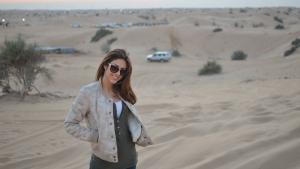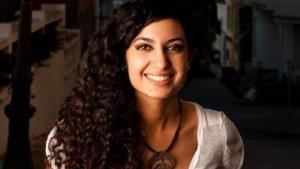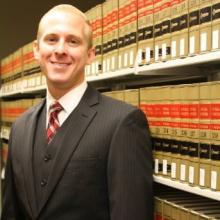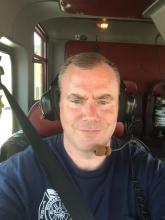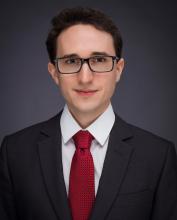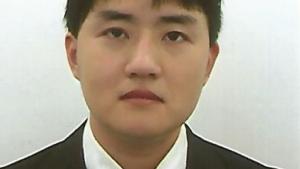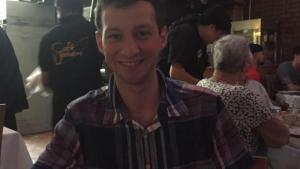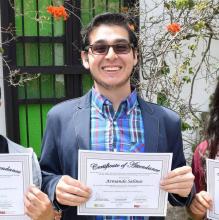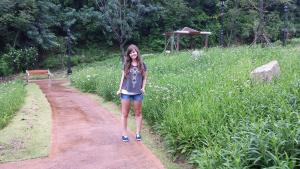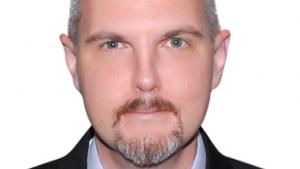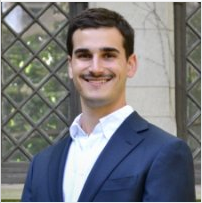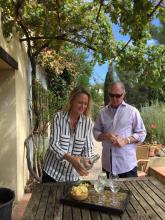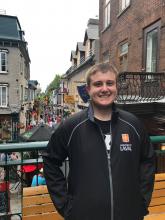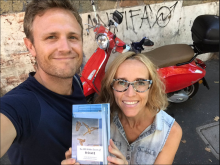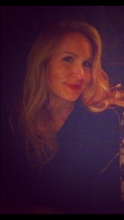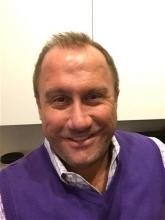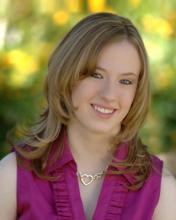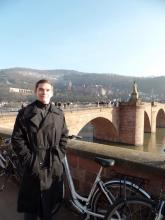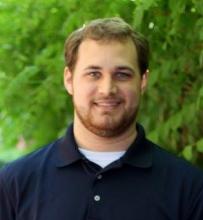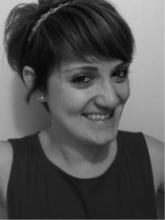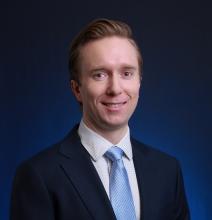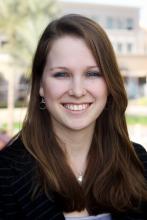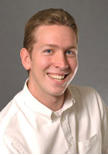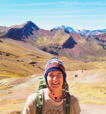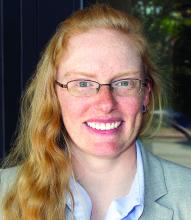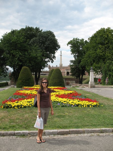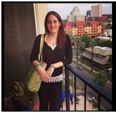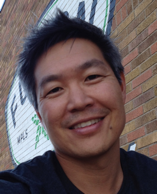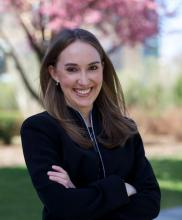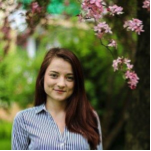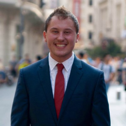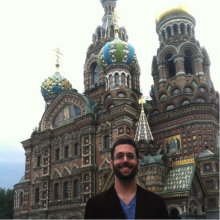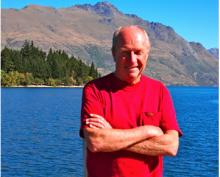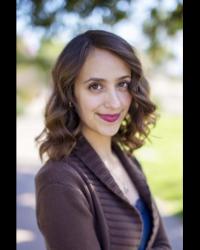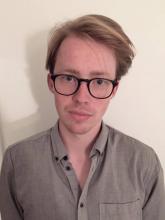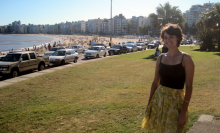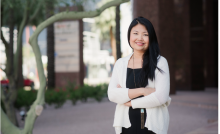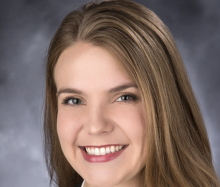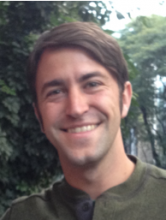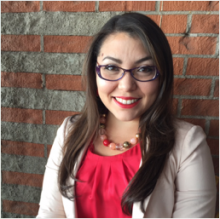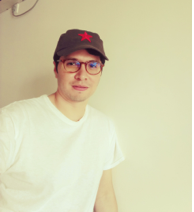Arabic Alumni
Name Brieanna Griffin
Graduation year May 2016
Major(s) Anthropology and Global Studies
Minor Arabic Studies
Certificates Islamic Studies and TESOL
What is your current job?
I’m currently a Boren Scholar studying Swahili and living in Arusha, Tanzania. The Boren scholarship/fellowship provides American university students with the opportunity to study a less commonly taught/known foreign language outside of Europe, Australia and New Zealand.
How does language and culture help you succeed in your job or career?
My previous study of Arabic at Arizona State University well-prepared me to not only apply and receive the Boren scholarship but also to live in Tanzania now. When you learn a language, you learn so much about yourself and your own culture. Language largely shapes our worldview and my study of Arabic has helped shape my worldview for the better as I now understand that we must learn about other cultures and languages in order to be active global citizens. I would not be where I am today without my diligent and continued study of languages and cultures which has given me the skills necessary to live in and learn in cultures and societies very different than my own.
Did you study abroad? If so, can you explain your experiences?
Yes, I did have the opportunity to study abroad twice while I was an undergraduate at ASU and now I am fortunately studying abroad for the third time. The first time I studied abroad I went to Meknes, Morocco (summer 2014) where I studied Advanced Arabic and Islamic Society and Politics for 10 weeks. I also taught English there at a local NGO that provided free English classes to students who otherwise could not afford English classes. The following summer, I had the opportunity to travel to Zanzibar, Tanzania with an NGO called America’s Unofficial Ambassadors (AUA). My time in Zanzibar was largely made possible by the Friends of the Center grant from the Center for the Study of Religion and Conflict and by Barrett, the Honors College. My experiences living abroad outside of the Western context have helped me to grow as an individual and realize my potential as a learner. My time in Morocco and Zanzibar ultimately made me the ideal candidate for the Boren scholarship which I am currently studying in Tanzania with now.
How did the language program at SILC prepare you for your future?
The Arabic language program at SILC gave me the necessary tools to navigate the fast-changing and increasingly interconnected world we live in today. I wish everyone was required to learn a language and acquire fluency in the United States. We would be a much better country and stronger nation if this were the case.
What was your favorite thing about learning a language?
I love when I begin thinking in a language and stop translating everything I say from English to that language. This is happening with my Swahili now and it is very rewarding!
I also love that knowing many languages allows one to get to know people you may otherwise not be able to. The world is a big place and knowing another language(s) opens many doors (as cliche as that sounds)!
Name Lena Arkawi
Graduation year May 2009
Major Interdisciplinary Studies with concentrations in business and communications; Honors Diploma; Arabic Certificate
What’s your current job?
I just completed a 6-month contract at the United Nations, working on the first-ever, World Humanitarian Summit, which took place in Istanbul, Turkey. Now, I am going back to school to pursue my Master in Global Advocacy at George Washington University.
How do language and culture help you succeed in your career?
Since graduating in 2009 from Arizona State University, I have lived in the Middle East, living in Qatar, the United Arab Emirates and Turkey, as well as traveling to different countries in the Arab World. Having knowledge in Arabic and the Middle East culture helped me tremendously in gaining professional contacts and making new friends; it also provided me with an opportunity to work in a career as a public relations expert in the Middle East region. I often worked with Arabic-speaking media professionals, as well as developed and executed PR strategies that targeted Arabic-speaking audiences.
Did you study abroad? If so, can you speak about your experience?
I studied abroad in China, South Africa and Qatar. Studying abroad was the best experience I had in college. Studying in another country helps you grow, learn and explore different cultures, religions and languages, which expand your world view.
How did ASU and the language program at SILC prepare you for your future?
SILC’s Arabic language program prepared me for my time in the Middle East. The Arabic language courses strengthened my ability and confidence to communicate in Arabic. I am fortunate to have gone through the program, as those years I spent learning the language and culture provided me many opportunities to meet new people and secure jobs while I was living in Qatar and the United Arab Emirates.
What was your favorite thing about learning a language?
My favorite thing about learning a new language is that it opens the door to speak with more people who speak that language.
For me, my favorite thing about learning Arabic was that it strengthened my bond with my grandparents who still live in Syria. Since I am not able to see them often, my only means of connecting with them is by phone. Before the SILC program, I could only tell my grandmother a handful of sentences in Arabic (and she does not speak a word of English, besides “Hi, and I love you”). So after the SILC program my relationship to both my grandmothers became stronger because I was finally able to communicate in Arabic. Since then, I’ve called them more often and was able to learn about their life stories. Before the Syrian Revolution in 2011 and since graduating from college, I was able to visit my grandmothers 4 times. Thanks to my studies, I was able to spend my time with them and understand them in ways I never fully was able to when I was younger.
Name Amirah Ismail
Graduation year 2009
Majors Global Studies and Justice Studies
Minors/Certificates Arabic Studies and Islamic Studies
What's your current job?
I'm a Foreign Service Officer at the U.S. Department of State, currently working at the U.S. Embassy in Algeria.
How do language and culture help you succeed in your career?
Being a successful diplomat requires excellent language skills and substantive knowledge of international cultures. By speaking to people abroad in their own language, I can really connect with them, learn, and show that I respect their culture. And in this way, as an American and a diplomat, I can build new bridges.
Did you study abroad?
If so, can you speak about your experience? While at ASU, I was fortunate to take part in two study abroad opportunities: a summer program in Regensburg, Germany focused on German language and culture; and a semester abroad program at the American University in Cairo where I took courses in Arabic language, literature, sociology, and Islamic studies. Both programs were fantastic! I really enjoyed being immersed in local cultures and participating in a wide range of extracurricular activities. My time in Cairo was extremely valuable, as it led to a fascinating internship the following year at a well-known NGO founded by one of the region's leading democracy and human rights activists. My studies there also laid the foundation for the honors thesis I defended at the Barrett Honors College and prepared me well for the start of my career with the U.S. Department of State.
How did ASU and the language program at SILC prepare you for your future?
I had a wonderful experience at ASU learning from talented professors and fellow students and participating in student clubs. In particular, I am truly grateful to have had SILC's Dr. Souad Ali as my professor, thesis director, and mentor. I learned a lot from her courses, and from the guidance, she provided as I prepared my honors thesis. Her support and recommendations also helped me prepare a competitive application for the Charles B. Rangel International Affairs Graduate Fellowship, an award I won just one month before graduating from ASU. As a Rangel Fellow, I leveraged my ASU experience, obtained an M.A. in Middle Eastern Studies from George Washington University, and began working in the Bureau of Near Eastern Affairs at the U.S. Department of State.
What was your favorite thing about learning a language?
My favorite thing about learning languages is going beyond the textbook, beyond the classroom. Watching movies and TV, listening to music, reading the news, talking to locals, exploring a new street or city--this is really how you expand your vocabulary and immerse yourself in a culture. At ASU, I spent time engaged in these activities through the Arab Student Association and during my time abroad at the American University in Cairo.
Classics Alumni
Name Brandon Curdie
Graduation year 2012
Major BA in European History and BS in Political Science
What's your current job?
Associate at Klauer Law, PC. I recently passed the Bar Exam and waiting to receive my bar number from the State Bar of Arizona.
How does language and culture help you succeed in your career?
I firmly believe that the time I spent studying Latin as an undergraduate student at ASU tremendously helped in law school, taking the bar, and will continue to help as I practice law. Just like translating Latin, the law and how one understands it involves great deal of reasoning and logical analysis. I was lucky enough to have great Latin professors at ASU that instructed Latin in a way that required their students to develop analytical and reasoning skills.
Studying the different cultures in my undergraduate studies also prepared me for the practice of law. On any given day, I do not know who is going to walk through the door. Being able to effectively communicate and most importantly, advocate for people with different cultural backgrounds, is vital for a successful attorney. Studying cultures that differ from mine, helped, and will continue to help my effectiveness as an attorney.
How did ASU and the language program at SILC prepare you for your future?
As a student, whether you take a course in Latin, Greek, Roman History, etc. you will inevitably spend a great deal of studying. For me, my time studying my SILC classes prepared me (more than others) for my career. You can often get through typical undergraduate courses by “cramming” the night before a big test. When studying Latin, that is not an option. You have to develop, and stick to, a routine of honing in your craft daily. Creating this kind of work habit is essential to succeeding in law school, taking the bar, and practicing law.
What was your favorite thing about learning a language?
The professors and fellow students that I met while taking Latin. I am still in contact with a number of my fellow classmates and professors. Professor Poudrier, Arena and Haberman were the most professional and helpful professors I had while at ASU.
Any advice for current language studies students?
Yes studying a different language opens opportunities for a career in teaching the language, but that is not the only option. I am an example of someone who studied a language and took from it more than just the ability to translate or teach it. I took one route, but there are many routes language students can take and use their skills they learned to further their career. Studying a different language makes you actually think; that obviously can be used for anything in everyday life.
Name Michael Bigg
Graduation year Spring 2014
Major European History; Classical Civilization
What's your current job?
Firefighter/Paramedic
How does language and culture help you succeed in your career?
I took two languages at ASU: German and Latin. Now neither are major languages in the Phoenix metro area but they have been immensely helpful in thinking logically and understanding a diverse customer base through being open to and interested in learning about other cultures. Furthermore, I just completed a year-long paramedic program and having some knowledge of Latin was a great asset in learning medical terminology and physiology. There were moments I was completely lost but I'd understand what the root word in Latin meant and it would help me get on the right path.
Did you study abroad? If so, can you speak about your experience?
I did a study abroad session in 2012 for German. It was one of the best experiences of my life. It is one thing to study the language in a classroom, it is quite another when it is being spoken around you and you immerse yourself in the culture, the history and the daily life of native speakers. Simple things like ordering food become a challenge but also force you to grow more confident in your language skills..
How did ASU and the language program at SILC prepare you for your future?
I've had a lifelong love of history and learning about other cultures but learning a language takes it a step further. Once you begin to understand and think in another language it reveals another layer of a people. Many of the characteristics of a culture are reflected in their language. My second degree, Classical Civilization, went very in-depth into the history, politics and literature of the ancient Greeks and Romans and really focused on thinking critically and research. So both degrees and both languages prepared me for the future by appreciating the differences in various cultures, critical thinking and research and in my current field those are all vitally important.
What was your favorite thing about learning a language?
The people, both fellow students and instructors. I met amazing peers and the professors in both the German and Classics departments were fantastic people who really care about student success.
Any advice for current language studies students?
Get involved in the related extracurricular activities. I joined the German club and Solis Diaboli and it is a great way to meet people, get involved and they are terrific resources for tutoring/networking/study groups. Plus they are a lot of fun!
Chinese Alumni
Why did you choose to do the flagship program? What makes it so unique?
The summer before my freshman year at ASU, the then-director of the Chinese Language Flagship Program asked how I planned to differentiate myself after college—I honestly didn’t have a great answer. She recommended that I look into studying Chinese and, long story short, I fell in love with it.
The Language Flagship is a national initiative to create the next generation of “global professionals” by providing the framework (mental, financial, and emotional) within which students can achieve superior language proficiency in critical languages such as Chinese. I think that Flagship is unique in four regards:
-
the program provides significant information and support to allow participation in a number of study-abroad experiences, including the Capstone year in China;
-
the program fosters a cohort mentality, which results in intimate ties between students from all Flagship schools (ASU, Brigham Young University, Indiana University, University of Oregon, etc.);
-
the program does not trivialize or shy away from the difficulty of learning Chinese, instead it challenges students to actually achieve superior language proficiency; and
-
the program is basically a massive “personal-pan pizza,” allowing students to pick and choose their knowledge specializations, courses, and work experience based on professional interests.
Part of your program included the Capstone year, involving time abroad at a university and an internship in China. Can you speak more about this experience? How did it benefit you?
The Capstone is the culmination of The Language Flagship experience and, as such, is the final result of years of intensive Chinese study and the last step to reaching superior language proficiency. What sets Capstone apart from another study abroad programs is its length and the degree to which students are encouraged to learn through immersion by studying, living, and working in China.
The year is split into two components: a semester at a top-ranked university taking classes (in Chinese, of course!) alongside fellow native students, and a semester internship working at a company/NGO of the student’s choosing. The classes that I took ranged from Chinese media during the Cultural Revolution to business law, and from professional writing to strategic management. Although I had previously taken classes conducted entirely in Chinese, it was incredible to experience the Chinese education system first-hand and provided an amazing sense of accomplishment when I realized that I could “keep up” with my native classmates.
I ended up interning at an international nuclear energy consulting firm headquartered in Shanghai. My experiences at Nicobar Group solidified my passion for consulting and provided the first truly professional venue to apply my Chinese language skills. Aside from the professional development aspects, I found a lifelong friend in my Chinese roommate, almost died on a mountain in NW China (I still recommend hiking it though!), was besieged by fireworks over Chinese New Year, got ripped off by my landlord, and formed a band with my internship co-workers.
All in all, I had had some crazy experiences in my previous trips to China, but the depth of interaction made possible by the sheer length of a year abroad allowed for even crazier adventures. The Capstone year benefited me both personally and professionally—and it was a ton of fun!
How did SILC and the program prepare you for your future career?
SILC and ASU’s Chinese Language Flagship directly prepared me for my future career. When I met with the then-director of the Flagship Program, I was determined to pursue a career in genetics research. I ended up graduating with my genetics degree, but I picked up Chinese as well along the way—Chinese and the opportunities available to me through the Flagship program served as the foundation for my transition from science to business.
By my junior year, after two years of research in two different labs, I had come to terms with the fact that my professional priorities lay elsewhere. One day, I ended up chatting in the Flagship office with a recent alum about his experiences working at the investment bank, Goldman Sachs. His description sounded significantly more in-line with what I was looking for in my career, and, after a bit of research, I found myself applying to be a summer analyst. The recruiters at Goldman Sachs ended up being familiar with the work ethic of previous Flagship alumni and were very welcoming of applicants from various backgrounds; I ended up receiving an offer!
Ten days after getting back from my internship, I left for Capstone. During the process of researching potential classes to take for the first semester, I found myself buried in forums and chatrooms comparing investment banking and management consulting, a career with which I was previously unfamiliar. Consulting, at least on paper, seemed to be the application of the scientific method to the business world. Best of all, the entire process required significant interpersonal communication and client interaction—in essence, the synthesis of aspects I found lacking in my previous professional experiences. I found international economics, strategic management, international finance, and business law courses at the Chinese university and tried them all, adding some formal education backing to the knowledge that I had previously acquired on the job.
As the first semester came to an end, I began looking for a consulting internship opportunity. It turned out that a Flagship alum was currently working at a nuclear energy consulting firm and, although I had no previous experience with nuclear engineering, my language abilities and previous track record proved to be sufficient to secure an offer. Nicobar Group provided me with the opportunity to work on market-entry strategy and project implementation—I loved it! I had found a career that I could be passionate about!
Knowing that there would not be a definite opportunity for me to work for Nicobar Group back home, I began researching the major firms in the US and preparing for case and FIT (resume) interviews. Several of my Flagship cohort classmates and the managing partner at Nicobar Group helped me connect with current management consultants, and, after a few months of preparation, networking, and interviews, I am happy to say that I landed a position as an entry-level management consultant!
It’s been a long journey full of twists and turns, but I successfully followed my passions and made the transition from genetics to management consulting, the common thread of which was my experience learning Chinese in Flagship. I can’t wait to move to Boston in April!
What area of in-depth study in the program was your favorite?
My favorite area of in-depth study was, without a doubt, Classical Chinese. Classical/Literary Chinese is a completely different language than modern Mandarin: there are no parts of speech, there is no punctuation, there are lexical differences, and characters have multiple/expanded meanings. Now, that may sound like the recipe for a headache-and it is-but translating Classical Chinese into modern Chinese/English is like solving a brainteaser that requires you to broaden your ability to interpret the meaning and make connections.
Not only that, but these are the texts of Confucius, Mencius, Sunzi (Sun-Tzu), etc. as they were originally recorded—there is something incredibly profound about being able to read ancient Chinese texts as an American in the 21st century. It melts cultural, linguistic, and temporal boundaries. Plus, you can quite literally quote what “Confucius says!” I liked it so much that I ended up working with my Classical Chinese professor to translate Daoist text for my honors thesis.
How does knowing another language help you succeed in life, both here and abroad?
I’m a big believer in the concept of linguistic relativity: the structure of a language affects how its speakers view the world. If language affects perspective, then learning another language should hopefully provide some insight on how/why speakers of that language view things in a certain way, thereby enhancing mutual understanding. On the flip side, learning how speakers of a language view things exposes the language learner to new perspectives, improving his/her ability to view and solve problems. Applying this to my experiences, my passion for Chinese stems from how vastly different it is than English, especially the character system. I believe that, as a direct result of my learning Mandarin, I am able to view problems from a more holistic perspective and make better connections between seemingly disparate ideas. These are traits that I found essential to memorizing Chinese characters.
What was the most challenging aspect of learning another language? Do you have any advice for current and prospective students?
I often jokingly say that between genetics and Chinese, Chinese was the more difficult major. There is definitely some truth to that statement though. The Mandarin dialect has five tones (including the neutral tone), a character-based system, two-character types (simplified and traditional), and a number of phonetic and lexical differences across regions. Overall, I think that these are the four most challenging aspects of learning Mandarin. For me specifically, it was definitely the tones. As a singer, I wasn’t quite sure what to do with them. Tones can mean the difference between saying “how much does it cost for a bowl of steamed dumplings” and “how much does it cost to sleep (with you) for a night.” There are countless examples like these that, while terrifying from a pragmatic perspective, make the learning process very fun. I eventually “found my Chinese voice” (it ended up being somewhere in between singing and different levels of gusto) and am now just in the endless process of accumulating vocabulary.
Regardless of the language, I think that it is important to create meaning for yourself in the language learning process and immerse yourself in the language environment as much as possible. Once you have the first one down, it should be easier to persuade yourself to pursue the second one—even if you do end up accidentally asking someone to sleep with you instead of buying dumplings.
Japanese Alumni
Name Daniel Li
Graduation year 2016
Major Japanese
What's your current job?
I'll be starting as an ALT in Japan this September.
How does language and culture help you succeed in your career?
I hope that I can use my context of multiple cultures to teach English as both a language and a tool for understanding culture and diversity. My own studies in Japanese have taught me a lot about my identity as an American and the significance of that from a global perspective.
How did ASU and the language program at SILC prepare you for your future?
The diverse student population at ASU definitely helped bring me out of my shell, so to speak. I've always felt a certain sense of "self-discovery through studying culture" throughout my studies, and I can say with certainty that SILC has helped me grow tremendously as a person.
What was your favorite thing about learning a language?
The feeling of progress that sneaks up you while learning a language never stopped surprising me. Semester after semester, I would look back and realize just how much I had learned in that short time. New languages eventually become a very tangible part of you and experiencing that became extremely motivating.
Any advice for current language studies students?
Never stop your exposure to your language of study. There are so many cultural nuances that embody a language that you just can't learn in a classroom or a textbook. As long as you don't forget your motivation to learn, you'll eventually ease yourself into deeper levels of understanding.
Name Kevin Salter
Graduation year 2016
Major BA in Japanese with a Korean Studies Certificate.
What's your current job?
I work at Authentic Brands Group as the coordinator for the sports brands team. My company is in essence an advertisement agency that happens to hold brands, many of which have retailers in Japan. I communicate with our licensees on a daily basis to ensure that their marketing and brand quality needs are met.
How does language and culture help you succeed in your career?
My company needed someone with language skills to ensure that when a Japanese partner sends us a certificate of insurance they are being transparent about what is insured. I also can check their social media posts against our quality criteria and answer any questions that a Japanese licensee who is not skilled in English may have. Knowing Japanese culture also helps me significantly when explaining decisions that a Japanese licensee has made to my team. More often than not the Japanese style of business differs from how things are done in the USA. Being able to facilitate communications through cultural differences among my peers has been a perk in the workplace.
Did you study abroad? If so, can you speak about your experience?
I studied abroad at Waseda University from 2013 to 2014 (in Japan). It was one of the best years of my life, and I would love to be able to live in Japan again someday. I started out studying as hard as I could, but I actually realized that staying in and studying wasn't helping me as much as talking with my new Japanese friends. I did not do a lot of traveling during my year abroad, which is something that I regret, so if I return to Japan on vacation in the future I think I'll take The Road to The Deep North and explore as much of the country as I can.
How did ASU and the language program at SILC prepare you for your future?
ASU showed me that there should not only be an emphasis on learning vocabulary and grammar but also having a functional understanding of Japanese history, pop culture and traditions is necessary to become truly fluent in the language. I've made a lot more friends in Japan joking about Murakami Haruki books than I have trying to talk about Taylor Swift. Not that I listen to all of her songs all the time or anything like that...
What was your favorite thing about learning a language?
My favorite thing about speaking a second language is being able to make friends with people who I otherwise couldn't. Speaking a second language opens up a door to a whole new world of people.
Name Armando Salinas
Graduation year 2016
Major Mathematics
Minor Japanese
What's your current job?
PhD Student under the AMLSS (Applied Mathematics in the Life and Social Sciences) program, here at ASU.
How does language and culture help you succeed in your career?
Currently, I am starting out as a PhD student in AMLSS. However, I would either like to be a translator or pursue a career in academia in Japan. Language and culture are used all around us, and understanding language and culture will allow us to communicate effectively with the targeted culture. I hope to become fluent in Japanese (as well as become super polite and mannered), that way I can obtain a career in Japan.
Did you study abroad? If so, can you speak about your experience?
I studied abroad at Nanzan University in Nagoya, Japan in the Fall of 2014. I was immersed in the culture (i.e. going to Kabuki, eating Japanese food with my host family, living the Japanese student lifestyle) and my Japanese improved (since they did not speak English). It was arguably one of the best moments of time in my life since my dream was to go to Japan. I now have a new dream; to return to Japan.
How did ASU and the language program at SILC prepare you for your future?
ASU, as well as the language program at SILC, gave me the tools necessary to communicate (as well as read) effectively in Japanese. Furthermore, they gave me a “foot in the doorstep” for careers in Japan. This is because Japanese culture heavily values “in-group” and “out-group” statuses, and I am now a part of the Nanzan University “in-group.” So I can use this to my advantage, thanks to ASU, as well as SILC.
What was your favorite thing about learning a language?
My favorite thing about learning a language is learning the framework behind the language. This includes how they construct grammar, as well as what they prioritize. For instance, Japanese culture values harmony. However, this harmony leads to “reading in-between the lines” and indirect comments to avoid conflict in social situations. As a student learning Japanese, I must learn to pick up on these social cues, which I find fascinating. Perhaps, it's better to say that I enjoy language because language invokes culture.
Any advice for current language studies students?
Make sure to think in the language's framework. I say this because not thinking in the language framework leads to direction translations. And if there is one thing I am strongly against, it is direct translations. There is not always a direct translation for phrases (especially idioms) in English to the targeted language.
Thinking in the language's framework promotes creativity and will make learning the language that much easier.
Korean Alumni
Name Kevin Salter
Graduation year 2016
Major BA in Japanese with a Korean Studies Certificate.
What's your current job?
I work at Authentic Brands Group as the coordinator for the sports brands team. My company is in essence an advertisement agency that happens to hold brands, many of which have retailers in Japan. I communicate with our licensees on a daily basis to ensure that their marketing and brand quality needs are met.
How does language and culture help you succeed in your career?
My company needed someone with language skills to ensure that when a Japanese partner sends us a certificate of insurance they are being transparent about what is insured. I also can check their social media posts against our quality criteria and answer any questions that a Japanese licensee who is not skilled in English may have. Knowing Japanese culture also helps me significantly when explaining decisions that a Japanese licensee has made to my team. More often than not the Japanese style of business differs from how things are done in the USA. Being able to facilitate communications through cultural differences among my peers has been a perk in the workplace.
Did you study abroad? If so, can you speak about your experience?
I studied abroad at Waseda University from 2013 to 2014 (in Japan). It was one of the best years of my life, and I would love to be able to live in Japan again someday. I started out studying as hard as I could, but I actually realized that staying in and studying wasn't helping me as much as talking with my new Japanese friends. I did not do a lot of traveling during my year abroad, which is something that I regret, so if I return to Japan on vacation in the future I think I'll take The Road to The Deep North and explore as much of the country as I can.
How did ASU and the language program at SILC prepare you for your future?
ASU showed me that there should not only be an emphasis on learning vocabulary and grammar but also having a functional understanding of Japanese history, pop culture and traditions is necessary to become truly fluent in the language. I've made a lot more friends in Japan joking about Murakami Haruki books than I have trying to talk about Taylor Swift. Not that I listen to all of her songs all the time or anything like that...
What was your favorite thing about learning a language?
My favorite thing about speaking a second language is being able to make friends with people who I otherwise couldn't. Speaking a second language opens up a door to a whole new world of people.
Translating her skills into a career in sustainability
May 6, 2016
Editor's note: This is part of a series of profiles for spring 2016 commencement. See the rest here.
When Bridget Harding began looking for jobs in her field of sustainability, she noticed something interesting about every interview she had — the first thing employers asked her about was her ability to speak Korean.
Harding, a senior majoring in sustainability, first encountered Korean in high school. She enjoyed the language so much that she chose it for her language requirement when she started at ASU, the only college in Arizona that offers the language. She continued to enjoy it and went beyond the required two years, taking upper-level courses in the School of International Letters and Cultures into her junior and senior years.
Harding went on to study abroad in South Korea in 2013, where she noticed the overlap between her studies in ecosystems and her ability to speak Korean. She became interested in the East vs. West perspectives on nature and ecology. In Eastern cultures, people often see themselves as part of nature, while in Western culture nature is often viewed as a place of resources, she said.
“I think it’s important to study abroad no matter what your major is,” Harding said. “You can learn a lot about yourself and the world, and apply that to what you want to do.”
The summer of 2015, during her sophomore year, Harding applied for a research position with the National Science Foundation, hoping to study insect and riparian environments. During the interview, the first thing they noticed was her language skills.
“I hadn’t taken entomology, but I was able to pick up the Latin terms based on being a language student,” Harding said. “They pointed out that my ability to learn a difficult language like Korean meant I could learn difficult computer programs as well.”
In the fall of that year, Harding then applied for an internship with the Nature Conservancy, When she received an interview, the interviewers were again curious about the Korean on her resume. This time, she said, she knew exactly what to say.
“I’d be able to learn their programs quickly,” Harding explained. She would need to learn GIS, or geographic information systems, a key part of the Nature Conservancy’s work. Harding realized that knowing how to piece together a difficult language like Korean would give her the skills she needed to grasp the new program easily.
During her time at the Nature Conservancy, Harding began thinking about how she wanted to spend her time after graduation. With the encouragement and support from professors in SILC (Dr. Ebru Turker) and sustainability, she applied for the Fulbright Scholarship Program in South Korea.
“You don’t have to know the language to be accepted, but since I do, I thought I would have an edge,” Harding said.
Harding will leave for South Korea this July and will live with a South Korean family during her stay. She will be placed in a classroom as a full-time English teaching assistant, creating lesson plans and practicing conversational skills with the students. Although the program will last one year, Harding has the opportunity to extend it up to three years.
“I feel very welcomed there,” Harding said. “South Korea and the U.S. have a good relationship when it comes to Americans, and the culture is starting to come over here too.”
As an Arizona native, Harding wanted to take advantage of every opportunity at ASU.
“I tried to get as much out of college as possible,” she said. “It’s really rewarding in the end when you go to the country and people can really understand you, and it improves your confidence.”
After her time abroad, Harding will attend graduate school at the University of Washington Marine Affairs program. Ironically, one of the only other institutions that offer a master's degree in this field is located in South Korea. She hopes to one day work for NOAA, the National Oceanic and Atmospheric Administration, or continue with nonprofits like TNC.
Written by Sarah Edwards
Vietnamese Alumni
Graduation year: 1999
Major: Justice Studies Ph.D. Program
What's your current job and what do you do there?
I'm the director of the Health Office for the US Agency for International Development (USAID) in Vietnam. From our offices in Hanoi, I manage a team of 20 Americans and Vietnamese professionals who work hand in hand with the Vietnamese government to address some of the most challenging health issues and to strengthen the health system. As one of five US government agencies that comprise the US President's Emergency Plan for AIDS Relief (PEPFAR) in Vietnam, the USAID Health Office manages comprehensive HIV prevention, care and treatment programs. We have imported anti-retroviral (ARV) drugs to provide HIV treatment for more than 50,000 Vietnamese living with HIV and have supported the introduction of methadone to treat heroin addiction and prevent the spread of HIV. The USAID Health Office also manages a strong Emerging Pandemic Threats (EPT) program that works with the Vietnamese Ministry of Health and Ministry of Agriculture and Rural Development to prevent, detect and respond to disease threats such as Avian Influenza.
How does language and culture help you succeed in your career?
My language skills were especially important in securing my first work experiences in Vietnam, first with the UN Office on Drugs and Crime, UNICEF and then USAID. When I joined the foreign service I was able to test out of Vietnamese language when many colleagues needed to spend six months at language school in Washington D.C. Beyond that, Vietnam is a complex country with regional and cultural differences from the mountainous Northwestern provinces bordering China to Hanoi in the Red River Delta, Hue and the central provinces to Ho Chi Minh City and the Mekong Delta. Speaking Vietnamese is a tremendous benefit when meeting with local leaders and understanding the particular needs of a province, city or village. Being able to carry out a conversation with a provincial department of health colleague or commune health worker builds trust and it often allows me insights into situations not readily understood by foreign colleagues who need to rely on interpretation.
Did you study abroad? If so, can you speak about your experience?
After studying Vietnamese language with Co Le Pham Thuy-Kim for three years at ASU I received a scholarship to attend the Vietnamese Advanced Summer Institute (VASI) in Hanoi in the summer of 1998. For a group of American college students the contrast between American and Vietnamese educational institutions was intense. Used to chilled ASU classrooms, we spent our time studying in an old French colonial building on Pham Ngu Lao street that was formerly the Ecole Française d’Extreme-Orient. The teachers were very dedicated and stressed not just the language, but the importance of history and culture to the development of the language. I still remember one instructor, Mr. Khoi, explaining that the Vietnamese term for country (dat nuoc) was composed of "land" and "water" and the importance of the land and water to the Vietnamese. And culture was equally important to our lessons, with incredible opportunities to learn about Hanoi, local food, Vietnamese opera, and to visit Vietnamese cultural heritage sites like Hue and Ha Long Bay. Based on these experiences at ASU and in Hanoi I received a Fulbright fellowship to research my dissertation in Hanoi throughout 1998 and 1999.
How did ASU and the language program at SILC prepare you for your future?
I wouldn't say that studying Vietnamese prepared me for my future as much as it was one step in a series of decisions that dramatically shaped what I am doing today. In 1994 I started my doctoral program at ASU with every intention of becoming a college professor. Looking through the course catalog one day I saw that ASU offered Vietnamese language and I thought it would be interesting to audit a semester. But the class was so interesting and Co Kim clearly cared about her teaching, so I continued for three years. If I hadn't elected to try Vietnamese; if the course hadn't been interesting; if I hadn't been introduced to Hanoi through VASI, I wouldn't be in Hanoi managing the USAID Vietnam Health Office today.
What was your favorite thing about learning a language?
The reason that I studied Vietnamese at ASU for three years was that we had an interesting group of students and a dedicated professor who spared no effort to make sure the class was enjoyable as well as educational. Lessons covered many aspects of Vietnamese society, culture, history and situations. In my perspective, the experiences Co Kim organized in the Vietnamese community were equally as instructive as those in the classroom. From visits to Lee Lee Asian grocery store in Mesa to learn about cooking, to invitations to participate in local Tet festivals in the Vietnamese community, to the end of semester exams which Co Kim hosted in her home (followed by Vietnamese food) the cultural aspects were my favorite.
French Alumni
Name Kerry LePain
Graduation year 2012
Double Major French, History with additional concentration in Portuguese
What's your current job?
I just left my previous job to pursue an MA in Latin American Studies at the University of Chicago. I was previously working as a project manager for a textile designer in Paris, France. We produced woven metal textiles for interior architecture projects (luxury brands, yachts, hotels, etc) around the world.
How does language and culture help you succeed in your career?
I was working in a French company founded in Paris, so French was our day-to-day language of operation. Because we did 80% of our projects internationally, I did quite a bit of translation from English to French for the company and also used Italian and Portuguese on an occasional basis.
Did you study abroad? If so, can you speak about your experience?
I studied for an academic year in São Paulo, Brazil. It was an incredibly formative experience, both as my first time living in a foreign country and my first time living my life in a foreign language. It still influences me today and was the catalyst for my upcoming master's program and my future career goals.
How did ASU and the language program at SILC prepare you for your future?
First and foremost, I was fortunate to have an ensemble of really stellar professors who encouraged me and accompanied my thesis writing process. I think the ability to study multiple languages and have that fit into my curriculum was quite advantageous because working in a place like Europe, speaking more than just two languages is a huge asset. I took a variety of classes in foreign languages, not just culture-related, but also incorporating aspects of political science and economy. This really prepared me for life as a working professional abroad rather than just an appreciator of foreign cultures.
What was your favorite thing about learning a language?
A sense of discovery. Every time I start learning a new language, I feel like the slate is wiped clean, and I start to get connecting dots. It's also an amazing feeling when you see a word in English or a phrase that the foreign language has helped you to understand in a different way. I see many words in English and can interpret them differently or see their history because of Romance language knowledge. It's great.
Any advice for current language studies students?
Keep going with it. People will often question why you're studying a foreign language because they haven't traveled or really understood the benefits of it. People told me French wouldn't get me anywhere, but I've lived in Paris for the past three years and met amazing people doing it and traveled and experienced so much. The ability to relate to entirely different populations of people in new ways is one of the most worthwhile things you can study.
What's your current job? What inspired you to write your book?
For 15 years now, I have blogged from my home in France. It is a dream job, one I could not have imagined back at ASU, in 1989, when friends and family asked, "What will you do with a French degree?" Professional blogging did not exist then.
Keeping up with French Word-A-Day, my online language journal, helped me to realize I had a passionate subject to share, so you could say it was blogging that inspired me to publish books. My Words in a French Life, was published by Simon and Schuster in 2006, followed by Blossoming in Provence.
How does language and culture help you succeed in your career and/or daily life?
It provides a lot of grist for the writing mill! Though I have lived half my life in France, there are still times when I feel like a fish out of water. Nowadays, instead of becoming frustrated, I write about it - using my knowledge of the French language to help illustrate these stories of French cultural differences.
Did you study abroad? If so, can you speak about your experience?
Yes! In 1989 a caring teacher, Madame Wollam, encouraged me to sign up for the program in Lille. It changed my life! I stayed with the most adorable family, who took me under their French wings. I had the chance to experience authentic French life thanks to these down-to-earth hosts, the Bassimon family, who took me along to social engagements and included me in their daily life.
How did ASU and the language program at SILC prepare you for your future?
By encouraging me to seize opportunities to grow in the language. After my study-abroad program ended, I did not want to return home right away, as I knew I was not done learning in France. This time it was Dr. Wollam (my professor's husband, head of the language department) who supported my writing project, allowing me to report on my extended stay in exchange for class credit.
What was your favorite part about learning a language and its culture?
Being able to meet someone I may never have had the chance to know. If you want to go beyond tourism--to the heart of the French and their colorful personalities, you must persevere in the language! Every new word learned is a step closer to appreciating all the wonderful characters here, on every park bench, in every bakery line, at every market stand...
Any advice for current language studies students?
Don't worry about what you will do with your degree! Think of the bigger picture -- and all of the doors a second language will open up! For me this has led to a meaningful life--and an exciting career--in France!
ASU student becomes a language professional at the School of International Letters and Cultures
By Gabriel Sandler — February 27, 2018
Arizona State University's School of International Letters and Cultures (SILC) not only draws people passionate about global life, but gives those people a chance to begin their global careers. Ralph Stage, a French major, has taken on many of these opportunities.
“I am a SILC ambassador intern,” Stage said. “My job is to help find academic internships and opportunities through the community, the Phoenix metro area, to help promote foreign language study and multicultural exposure.”
In addition to working for the school directly, Stage is also president of the French Club, helping other students improve their own language proficiency. Stage works as the treasurer of the SILC Attachés and helps organize SILC Café, supporting the weekly get-together for students of different language and culture studies to share what they’re doing.
For Stage, his interest in global studies came from his mother, who learned French in the Peace Corps. In high school, Stage would also study Spanish, but French was in the family. Between his French-speaking babysitter and a bilingual elementary school, he developed a strong language background, enabling him to maximize his time at SILC.
“I did the study abroad program in Quebec, Canada, I’ve been to Mexico, Guatemala, Dominican Republic, Guadalupe, Burkina Faso, Italy, France, London,” Stage said.
“It was really cool to go around the world and see how other people lived, how they interacted with each other,” Stage said. “When I was in Burkina Faso, Africa, I got to speak French with some of the people there … in Quebec it was a full immersion program, so it helped my language skills quite a lot.”
Across nations, Stage found that his ability to communicate directly gave him deeper experiences day to day. Whether it was better restaurants, better exploring or better local friendships, speaking the language let him “interact with the community in a way that you couldn’t get from a tourist brochure.”
Back in Phoenix, Stage’s improved language skills are increasingly useful. Stage plans to get involved in refugee resettlement and prepare to teach abroad, opportunities he’s learned more and more about through SILC. He has immersed himself in an intricate and diverse multilingual community.
“You’d be surprised what you’re missing out on by sticking to just English,” Stage said. “It’s a big world out there, with a lot of great things to check out … you’ll probably find out you love it.”
Italian Alumni
Why did you decide to study Italian?
I decided to study Italian at the age of 18 after a brief visit to a small town in Friuli called Gemona. I was only passing through for a couple of nights, but my hosts were so gracious and friendly that I felt compelled to learn more about their language and culture. In fact, we became good friends and still see each other regularly.
You are an award-winning multimedia journalist. What impact has your knowledge of Italian had on your work?
I've spent the majority of my career as a journalist in Italy, so knowledge of the Italian language has been crucial. Without it, I wouldn't be able to communicate with my sources, read government press releases, or tap into society at large. I know some non-Italian journalists who somehow get by without ever learning the language. How unfulfilling that must be.
You live in Italy; can you describe three aspects of the “Italian lifestyle” that have positively surprised you?
The walk-and-pause. This happens when you're strolling with an Italian. When s/he wants to make a point, s/he'll stop walking, turn, and make eye contact to underscore this crucial piece of information.
Intimate knowledge of the human digestive system, other internal organs. Where an American might say "my stomach hurts," Italians of all ages would be more specific. I once heard a young boy say "my spleen hurts." I couldn't even point to where my spleen is.
Valuing the genuine. That goes for food, wine, craftsmanship, etc. But it also goes for people. I find Italians tend to have a very good nose for nonsense. It's one reason why no one there has a good opinion of politicians. (Ask an Italian to name a single MP they find redemptive in any way...besides Berlinguer or anyone else who's long dead).
What would say to ASU students that are starting their journey in Italian studies?
Italian is useless if you can't find ways of applying it. This can be tough if you're not living in the country. So find ways to make it indispensable to your psychic well-being. Fall in love with Fabrizio De Andre's music, Elena Ferrante's novels, Dante's poetry, and Pasolini's films. Then, reflect on the fact that you'll never fully unlock their delights and mysteries until you learn Italian.
Regan O’Kon graduated from ASU’s School of International Letters and Cultures in 2002 with a degree in Italian Studies and a minor in French. After receiving her Master’s degree, she returned to teach at SILC for five years and now works as a trade marketing manager for Campari America.
Why did you choose this language?
I had a full scholarship at ASU, but I also needed to work full time. I saw an Italian class offered on Tuesday and Thursday evenings, and I signed up. Initially, I thought it would be fun to know some Italian because I LOVE pasta. So much so, that when I was little and chubby, everyone said I had a "pasta pot." I still remember my first day and learning to say "Mi chiamo Regan." I immediately loved the sound of the language, and with the support of the department, I began taking major-level classes my second year. My initial love of pasta became a love of the language, culture, and literary tradition.
What did you like most about SILC? What helped you prepare for your future?
The atmosphere at SILC was encouraging and personal – I had direct contact with all of my professors. Juliann Vitullo, Piero Baldini, and Chiara Lage all encouraged me to take more classes and further my studies. I also liked the community atmosphere and the Italian Club pizza and cooking parties. Between studying and teaching, I spent 10 years at SILC. My longest tenure anywhere. I still miss my professors and my students. The skills I honed as an instructor have helped me immensely in my career in business. Teaching will always be one of my great passions.
How does language and culture help you succeed in your career?
I have the opportunity to speak Italian with many of my colleagues. Most importantly, I have a cultural perspective on important customs and traditions such as the aperitivo!
What kind of an impact did study abroad have on your language experience?
I studied abroad twice in undergrad in Florence, Italy and my second year of graduate school in Naples. My study abroad experiences remain some of my fondest memories. It changed my life and offered me a great perspective on the breadth of cultural diversity within countries. In graduate school, I studied Neapolitan dialect and culinary traditions!
I still try to "study abroad" each year in Italy. I love the country, and I miss it when I don't visit regularly. I am currently planning my honeymoon in Sardinia and brushing up on my Italian.
Any advice for current SILC students?
FOLLOW. YOUR. HEART. Don't be discouraged from people who look at you cross-eyed and say, "What will you ever do with that degree?" Nothing is more marketable than authenticity. Trust yourself and your dreams. In many jobs, you learn your duties on the job. It takes time, patience, and dedication to learn a language. That discipline is reflected in your work ethic.
Take your time. Working is always there. Enjoy your study abroad, drink wine, eat new foods, and make new friends.
When it came time to choose his major at ASU, Jeff Root looked to his deeply-rooted Italian heritage for guidance. When Root began at SILC, he was encouraged by his professors to push his abilities further, both through the study abroad program and the study of literature. Plus, Root said, a 16th-century quote from an Emperor also helped affirm his decision to pursue a future in Italian: “I speak French to the King, Spanish to God and German to horses – but I speak Italian to women.”
How did you land the job at De Cecco Pasta?
I was working for a foodservice sales brokerage firm as the Italian Food Specialist representing a tomato company, a cheese company and an olive oil company. The firm was looking for an imported dry pasta line to fill out its portfolio so I reached out to De Cecco Pasta in Italy through email. During my 3 year stay in Italy, I used De Cecco Pasta regularly in both of the restaurants I was working. I wrote an email to De Cecco headquarters - in formal Italian - explaining what the firm does for the foodservice sales industry and what we believed we could do for De Cecco Pasta in the Arizona market. They awarded us the opportunity to represent them in the Arizona market and over time I demonstrated to them my knowledge and passion for the product. I was then asked to come to work for De Cecco directly as the Regional Foodservice Sales Manager for the western half of the United States. I also am the key point of contact for national business opportunities in the chain restaurant segment.
How does language and culture help you succeed in your career?
Italian language and culture are critically important in my everyday work with De Cecco Pasta. Although we have our headquarters, entire production facility and international marketing office in Italy, we do have a logistic and sales support office here in the U.S. located in New York City. We are a small group of about 20 people; I am the only American-born foodservice sales manager in the U.S. so my communication throughout the day is almost entirely in Italian with both my boss and my colleagues. Measurements and vernacular relating to pasta, production, sales, marketing, point of sale, travel expenses, product training…it’s all done in Italian. I also am a key point of reference for translating material from Italian to English. The skills I use in my job came directly from my education at ASU and from my experience on the Study Abroad Program in Italy. If it were not for my Italian language and culture proficiency, there is no doubt I would not be working for De Cecco Pasta. The “Made in Italy” aspect is so fundamental to the strength of the De Cecco brand, and many of the distributors and chefs we call on are native Italian as well. Business relationships tend to thrive in an environment of trust and confidence and our clientele prefers salespeople who speak Italian well. I travel to Italy for meetings and occasionally take large customers to Italy for tours of our facilities. There are also several international trade shows here in the US where we showcase our product line.
Can you speak more about your study abroad experience?
I went on the Study Abroad Program in Florence when I was 25. I arrived about 10 days before the start of the program to stay with my Italian family in Gaggio Montano – located in the Apennine mountains about 90 minutes northeast of Florence. No one in the town spoke any English, so for 10 days, my Italian grew minute by minute exponentially. By the time I arrived in Florence I felt like I had learned more in 10 days than I had studied it in the previous 2 years in the U.S. When classes began in Florence I already had crafted a plan: I was going to excel linguistically, head back up to Gaggio Montano every single weekend throughout the summer and then return home to graduate in December…then buy a one-way ticket to move back!
I returned up to see my relatives every weekend. As soon as class ended on Thursday I was on a train back up the mountain. My language skills erupted as I became more expressive, infinitely more confident and relaxed with all facets of the Italian language. All of the grammar I was taught at ASU suddenly seemed to fall into place so effortlessly. I was also working at my family’s bed and breakfast in Gaggio Montano, so I was introduced to a myriad of settings where I constantly picked up new vocabulary. This experience shifted my life in an entirely different direction. After graduation, I sold my belongings, my car and packed the only 3 suitcases I owned. I bought a one-way ticket and I was back on a plane to Italy where I would spend almost the next 3 years. Without this experience, I would most certainly not be engaged in two of my life’s deepest passions: Italian food and the Italian language.
How did ASU and the language program prepare you for your future?
The department was very vibrant and active. Professors Baldini, Candela and Vitullo were instrumental in my development both linguistically and scholastically. Vitullo and Candela were paramount in my foundation as a future scholar in Medieval and Renaissance Italian literature, as to how to construct arguments and how to read texts for meaning. Baldini convinced me to go study abroad which ultimately changed my career in the most positive way. I think the most helpful part of the program was the introduction to so many important classical Italian literary texts. From Dante to Petrarca, an in-depth cinema course and an Italian business writing course furnished me with a very solid literary foundation for my eventual entrance into graduate studies.
Any advice for current language studies students?
Don’t lose faith. The process is long and it takes what it takes. Discover the length you’re willing to go to be successful – do you want to be content or do you want to be fulfilled? Some make it, some do not. Those who make it have a story to tell and it’s usually filled with moments where he or she could have taken the easy way, or even given up, but instead they chose to engage. Find out what you want to do with the language and literature and then pursue it aggressively and with purpose. You can’t expect results if you’re not willing to put in the work. If you go on the Study Abroad Program, don’t spend $5000 getting drunk every night and speaking English at that Irish Pub in Florence only to then skip classes. You can do that here in the US. If you decide to go then make the absolute most of it; Don’t eat at McDonald’s. Go grocery shopping. Experiment with recipes and food. Get out of the center of the city and go where there is no English spoken. Go out of your way to network and build up opportunities that could bring you back for an extended period of time.
Every setting in life is a classroom and you’re always receiving information. It’s your choice what to do with the information. Prior to getting on the plane to go study abroad, my Italian language proficiency was on life-support – and today I am at native-fluency level. Anything is possible!
Name Amanda Prahl
Graduation year 2011
Major BA English Literature; BA Political Science
Minor Italian
What's your current job?
I'm currently an MFA Dramatic Writing candidate, teaching a screenwriting class here at ASU and working on my third play which will have its first reading this November. I'm also a private piano teacher and a published freelance writer.
How does language and culture help you succeed in your career?
I often write about periods of history, particularly European history, and draw on knowledge gained from SILC courses; my previous play was in fact inspired by a historical figure I first encountered in a course on Renaissance Paris and Florence. I specialize in musical theatre, which has a rich and close relationship to the opera tradition, so my knowledge of that cultural institution has helped me both in my creative and academic pursuits.
How did ASU and the language program at SILC prepare you for your future?
As simple as it sounds, I feel like knowing a second language is a true asset and something that brings me a lot of joy, particularly because it allows me to connect to my own heritage. It also reinforced a detail-oriented approach to language in general, which is very useful for a professional writer.
What was your favorite thing about learning a language?
I'm going to cheat and say two things! First, the joy of learning the language of my not-very-distant-at-all ancestors, which allowed me to connect to the culture that has been an undercurrent of my whole life. Second, I love language and words in general, so getting to explore a whole new language - and meet some wonderful people along the way - was a true joy.
Any advice for current language studies students?
Don't expect too much of yourself all at once; take it in pieces. And above all, build a good relationship with your professors and fellow students, and never be afraid to ask for more explanation or help.
German Alumni
Name: John Harkness
Graduation year 2016
Major History
Minor German
What's your current job?
I am currently serving for a year in the AmeriCorps VISTA (volunteers in service to America) program with the Arizona Refugee Resettlement Program. My title is public benefits analyst, and I collect and analyze data about how Refugees use public benefits in order to strengthen the capacity of the Refugee Resettlement Program, other state departments, and the resettlement agencies to share information with each other about how Refugees are using programs such as cash and medical assistance and employment services.
How does language and culture help you succeed in your career?
Studying language and culture, along with my major in history (shoutout to SHPRS), helped me develop a greater capacity for empathy. By studying others’ experiences, I am able to see new perspectives. In my current position, this helps me interpret the data I collect by recognizing that these refugees come from very different cultures and some very horrific situations, and therefore I can try to identify with their challenges.
In terms of a career, I want to go into international affairs, where starting with at least one foreign language is crucial.
Did you study abroad? If so, can you speak about your experience?
I spent 7 months in Germany in 2015, first as an intern with the US State Department in Frankfurt and then I did a study abroad semester in Munich. It was one of the best experiences of my life. I met and became friends with people of all different backgrounds and experiences. As an intern, one of my duties was to give presentations to German high school English classes about American politics and culture, and it was really special being able to talk to the kids about their perceptions and experiences of America while sharing my own point of view. In Munich, I was the only American exchange student at my university, so I became friends with students from all over the world, from India and Pakistan, to Italy and Finland, to Canada and Brazil. Studying abroad was always a goal of mine, and being able to live in a different culture was amazing.
How did ASU and the language program at SILC prepare you for your future?
As I said before, I want to go into international affairs, where language skills are very important. But also, while in college, I was able to do the majority of the research for my honors thesis in German. I think that showcased a skill of mine that will (hopefully) be valuable when applying to graduate school and jobs.
What was your favorite thing about learning a language?
My favorite thing was when I was in Germany, I was able to (mostly) communicate. Getting through a conversation, or even asking a question at the store was really satisfying. It wasn’t a conclusion to learning German, of course, but it just showed how much progress I had made on this skill.
Name: Samuel McClernon
Graduation year 2016
Major German
Minor Economics; Political Science
What's your current job?
I currently work as an Education Specialist at Global Launch (ASU) and a Graduate Writing Consultant at the Writing Center (UASP, ASU). I am in my first year of the MTESOL program at ASU.
How does language and culture help you succeed in your career?
Applying the principles that I learned from the languages and cultures that I have studied has greatly benefited me in my career choices. While influencing my decision to pursue an MTESOL degree, language and culture have also greatly aided me as a writing tutor in communicating effectively with both international and native-English students. At every turn of both my academic and professional careers, I find myself drawing on the concepts that I was able to both learn and experience throughout my undergraduate years.
Did you study abroad? If so, can you speak about your experience?
I had the opportunity to study for a semester at the University of Tübingen in Germany. The experience not only improved my confidence in my speaking skills in German, but I also came to better understand how to communicate interculturally. From my time abroad, I was able to further my educational experience upon returning, bringing a new perspective to classes. In the end, studying abroad became a large factor influencing my future career choice to pursue an MTESOL degree. While I certainly have no doubt that I would have been successful without studying abroad, there is no question that the path I have taken is shaped in many ways by this experience.
How did ASU and the language program at SILC prepare you for your future?
Through the courses I was able to take throughout my time as an undergraduate at ASU, I was able to develop many skills, including communication, intercultural communication, and critical analysis. In addition, ASU and SILC prepared me to pursue my goals and maintain the drive to succeed.
What was your favorite thing about learning a language?
There are too many things about learning a language that I could say are my favorite to really narrow it down to just one. However, some of these things include learning about the culture that is connected to that language; overcoming hurdles in developing listening, speaking, writing, and reading skills; and becoming proficient enough to communicate with native speakers of another language.
Name Amila Becirbegovic
Graduation year May 2010 (MA) May 2008 (BA)
Major German MA, German BA
Minor Justice Studies
What's your current job?
I am a PhD Candidate and German Instructor at the University of California, Davis. I teach beginning and intermediate German language courses, as well as upper-division German, Film and Human Rights content courses, from post-WWII German writers to contemporary genocides and Holocaust representations. I am currently finishing my dissertation, Mediated Memory: Visual Culture and Prosthetic (Re)Memory in Post-War Germany, which examines how contemporary generations remember the Holocaust through literature, comics and film and what impact popular visual remediation of the Holocaust has on current genocides and the refugee crisis.
How does language and culture help you succeed in your career?
In the German language courses that I teach I am able to access authentic German material, which is extremely beneficial and a skill that I can transfer to my students by bringing the German language and culture alive through authentic texts. Likewise, in my upper-division content courses, I am better able to explain difficult topics and concepts because these ideas and histories are available to me as original sources in German, which authenticate my research and the content that I teach.
Did you study abroad? If so, can you speak about your experience?
I am originally from Europe and was born in Bosnia. After the onset of the Bosnian war, and as a consequence of the ensuing genocide, I was a refugee in Hannover, Germany from 1992-2000, before moving to Tempe, Arizona. I started my undergraduate and graduate studies at ASU, with a focus on Holocaust memory and a minor in Justice Studies. While I did not have the traditional study abroad experience, I certainly taught many German students at ASU who took advantage of the many wonderful study abroad opportunities and the exchange program with Regensburg, Germany. Many of my colleagues at ASU were also fellow instructors from Regensburg. The exchange program allowed for a more diverse representation of Germany, by introducing undergraduates and graduate students alike to students from southern Germany and showcased their experiences and expertise.
How did ASU and the language program at SILC prepare you for your future?
I always knew that I wanted to teach and the German program at ASU provided me with the opportunity to start my German teaching career. I was able to instruct various lower and intermediate division German language, grammar and culture courses. This was a truly unique educational experience and I greatly benefitted from being able to stand in the classroom as an independent instructor so early in my career. In addition to teaching German at ASU, I was also able to partake in many cultural activities on campus, from the weekly Stammtisch meetings to German club events and the annual High School German language contest. The ASU German program instilled within me a sense of community and an appreciation for teaching German courses to undergraduates. I have now been teaching for over a decade and many of the pedagogical techniques and strategies that I acquired at ASU are still with me and accompany me into every new classroom and institution.
What was your favorite thing about learning a language?
Since I was already a German heritage speaker upon arriving at ASU I wasn’t necessarily looking for formal language training. However, I was pleasantly surprised by the depth and value of the courses that I took and how much they added to my existing language foundation. In particular, Dr. Daniel Gilfillan’s upper-division special topics courses, which were not only educational and rich in subject matter, but his passion for German history, visual and contemporary culture and the individualized attention and feedback that he invested in each student really motivated me to pursue German as a career. Besides the courses, which resulted in a lifelong friendship with my fellow peers and even with the instructors, I benefitted immensely from the ASU community at SILC. The interdisciplinary nature of each program was extremely beneficial and fostered a collaborative atmosphere, where students could take classes from SILC faculty on various interdisciplinary subjects and be surrounded by many different languages, cultures and histories.
Romanian Alumni
"In 2006, I had the opportunity to study abroad in Europe. Most of my friends were selecting popular destinations such as Rome, Dublin, or Paris. While their experiences played a memorable role in their life, they all agree my decision of choosing Romania was the best. The journey opened my eyes to the world during a historical time in Romanian history - entrance into the European Union. Romania's economy has nearly doubled since this period. Seeing the beginning of this golden age was one of many unexpected benefits of choosing to study in Romania. From a professional perspective, listing "Romania study abroad" is always a shining light on a resume. The world of global commerce has shifted significantly within the past decade - forcing companies to hire the most adaptable and malleable employees. There have been many occasions where I have shared learnings during my trip to Romania during client meetings, and leadership training sessions. I believe my trip to Romania has played a role in my success today as a regional sales director for a multi-national organization. The Romanian spirit still follows me in my day-to-day life. If you get the chance to go to Romania, then I trust it will also follow you."
"My time in ASU’s Romanian program gave me the opportunity to have a truly unique study abroad experience living in Cluj-Napoca, Romania. During my six-month stay in Cluj, I was fully immersed in Romanian culture, learning the language from my non-English-speaking host, taking classes at Babes-Bolyai University, and traveling around the Romanian countryside to see Romania’s history firsthand. This experience, and specifically my experience with the uncommonly kind Romanian people, taught me a great deal about not only cultural understanding but human understanding, which has paid dividends in my professional career."
Bosnian|Croatian|Serbian Alumni
After finishing work in BCS in 2003, Robert went on to win a Fulbright research award to Croatia; there he studied at the Faculty of Philosophy and conducted archival research on a MA thesis. He went on to return to former Yugoslavia for NGO work in Bosnia in 2005, and advanced language study in Serbia, also in 2005. After conducting more archival research in Belgrade in 2007, Niebuhr finished his PhD on the history of Titoist Yugoslavia. Niebuhr now holds a faculty position at Barrett, the Honors College at Arizona State University. Niebuhr also co-authored two language-learning books, Beginner’s Serbian and Beginner’s Croatian, published by Hippocrene Press as well as a travel guide to Croatia; he continues to publish on topics of Yugoslav foreign policy during the Cold War.
Currently Vid (who graduated with a major in sustainable engineering and a minor in Slavic studies) is spending his first year teaching English in Thailand through the Fulbright scholarship. Then for his Boren Scholarship service requirement, he will be moving back to DC to work for the U.S. State Department. He will be working to improve the sustainability portfolio of embassies around the world by making them more "green" and energy-efficient with his background in Sustainable Engineering. Vid says, “If it wasn't for my background in the BCS language and everything I was able to leverage through the SILC program at Arizona State University, I would have never been remotely competitive for these scholarships and jobs. My future goals and aspirations to work internationally on sustainable development and social entrepreneurship have only been ignited by my positive experience through the BCS program, and I highly recommended it to for anyone trying to continue their language skills and work internationally.”
Christopher Livesay, who took BCS and SLV courses, is an award-winning foreign correspondent and producer based in Rome. His recent work focuses on the Middle East conflict, Europe's refugee crisis, and the threat ISIS poses to the West. He has reported for the prestigious documentary series PBS FRONTLINE on veteran exploitation in the United States; for NPR on underground rock music in Iran; and for VICE News on mafia blood feuds in Italy. For three years Livesay was a staff reporter and editor at ANSA, the leading Italian news agency, where he was part of the team that broke the story of Pope Benedict XVI’s shocking abdication, and the election of Pope Francis. In 2016 he was among the first reporters to arrive during the aftermath of a deadly earthquake that ripped through central Italy, where he filed live dispatches, reports and analysis for NPR and PBS. He holds a master’s degree (highest honors) from the Columbia Graduate School of Journalism in New York City. He is currently directing a documentary on clandestine groups fighting ISIS.
Amanda, who took introductory and intermediate BCS, graduated from ASU in 2010 with a BA in English (Linguistics), a BA in Russian, and a certificate in Russian and Eastern European Studies. She earned her Masters in Russian Language, Literature and Linguistics with the department of Russian and Slavic Studies at the University of Arizona in 2012, and returned to Phoenix, where she taught elementary Russian at ASU. She has also had the pleasure of teaching beginning Russian in the Critical Languages Institute at ASU's Melikian Center. She began a PhD in Applied Linguistics at ASU in 2013, and started law school at the University of Arizona's James E. Rogers College of Law in 2014. Her planned dissertation topic is linguistic issues of constitutional and statutory interpretation in U.S. and Russian law. Amanda will complete her law program in May of 2017 and will then serve as a law clerk to Justice Brutinel on the Arizona Supreme Court for a year before beginning as an associate at the law firm of Snell & Wilmer.
Wendy graduated from Arizona State University in 2009 with degrees in Political Science, History, and Spanish. One of her most rewarding experiences at ASU was completing BCS classes. She was born in Serbia and moved to the United States when she was very young, and the formal language training she received at ASU was the perfect way to enhance her knowledge of her family's native language. After college, she attended Yale Law School, where she participated in moot court and a Supreme Court clinic. She is currently a litigation associate at a top law firm in Washington, D.C.
Polish Alumni
“Having taken Polish language classes with both Mrs. Oginska and Professor Sipka at ASU has enabled me to take advantage of some wonderful opportunities I would not have otherwise been able to take advantage of without knowledge of the language. In 2013 I was accepted into a Spanish literature conference in Bielsko-Biała where I not only shared my research but also made connections with several professors and university students assisting the event. The following year I applied and received a scholarship to pursue my Polish language studies at the Jagiellonian University in Krakow for a period of 6 weeks. Since then I have enjoyed continuing to use the language in the context of looking at examples of experimental digital literature (the topic of my dissertation) being produced not only in the context of the Spanish speaking countries but also comparative samples of literary and artistic creations from Poland” Jennifer Byron received her MA in Spanish from Arizona State University and her BA in Spanish and Secondary Education from Marist College in Poughkeepsie, New York. She is currently a TA of Spanish at Arizona State University and is working toward her PhD in Spanish culture studies with a focus on digital narrative.
"Learning Polish in Mrs Oginska's class has helped me tremendously in building relationships with artists in Poland. I'm working on partnering with the Art Academy in Wroclaw, Poland to create an intentional exchange program for ceramics students. Communicating in Polish will also help in breaking barriers and building rapport with the Polish students. I'm excited to continue on this journey." - Sam Chung, Associate Professor of Ceramics, ASU
After studying Polish at ASU, Jamie Brooke Forseth was named a U.S. National Security Education Program scholar to Poland where she studied in Krakow and Poznan. She returned to ASU to earn four bachelor degrees in political science, English literature, violin performance and interdisciplinary studies as well as a master's degree in political science. Forseth had the privilege of working for Ambassador Barbara Barrett as a research manager in the U.S. and as the Ambassador's personal chief of staff at the U.S. Embassy in Finland. Forseth went on to earn an MBA from Yale School of Management and subsequently progressed to managing credit analysis and strategy on Goldman Sachs' municipal trading desk. Today she is a partner and head of credit research at Whitehaven Asset Management, a hedge fund based in New York with a focus on the U.S. municipal bond market.
"My name is Marta and I graduated Arizona State University with a B.A degree in Russian Language and Literature with a Slavic Languages Minor (focus: Polish Language) in May 2010. My story at ASU is an interesting one, as I experienced quite the metamorphosis. My freshman and sophomore years at ASU consisted of rigorous schedules filled with science and mathematics courses as I was at the time majoring in Kinesiology. I quickly realized that I was lacking an intellectual challenge. I immediately began to sign up for courses outside of my major map: Russian Language and Literature, Polish Language, Linguistics, etc. It was then that I discovered my love of studying the language. I look back on my ASU years as a time of personal growth & development. During my 4 years at ASU, I also worked full-time as a teller at Wells Fargo. During my senior year at ASU, Professor Sipka approached me with the opportunity of a lifetime. The Slavic Language Department at ASU’s School of International Letters and Culture was accepting applications to participate in a summer program to study Polish Language, Literature and Culture at the prestigious Jagiellonian University in Krakow, Poland during the summer of 2014. Getting accepted into the program was a life-changing moment in my life. The six-week program consisted of daily language lessons, cultural excursions, optional evening courses (encompassing a variety of interesting subjects) and interacting with students from all over the world. Once the program was over, I made a monumental decision to stay in Poland. I have since been living and working in Krakow, Poland for over two years. Due to my language skills and previous work experience with Wells Fargo, I found a job as an Investor Service Specialist at Brown Brothers Harriman & Co. I put my language skills to use on a daily basis, servicing investors from all over the world. I pride myself on my hard work and am continuously recognized. I have grown a lot in the firm over the last two years and will maintain to do so. Outside of work, I spend my free time exploring the limitless activities and attractions living in Krakow offers. I have always been very proud in my Polish heritage, and feel that living in Poland has allowed me to experience a cultural reawakening." -Marta
"My name is Bart Zalinski, and I am an alumnus of Arizona State University- W.P. Carey School of Business and the Polish Language and Culture program. Currently, I am a Supplier Performance Analyst at Southwest Airlines in Dallas, TX. Before joining Southwest full-time in May, I completed internships at UTC Aerospace Systems, Honeywell Aerospace, and two rounds at Southwest. I am grateful for the opportunity to study and grow proficiency in my family language during my collegiate career, as I still use Polish every day."
Russian Alumni
Name Graeme Fox
Graduation year 2014
Major Russian and English Literature
Minor certificate in Russian and East European Studies
What's your current job?
Graeme Fox began studying Russian in the summer of 2011 at the Critical Language Institute (CLI) and the following summer studied third-year Russian through CLI in Kyiv, Ukraine. Fox was awarded a highly competitive Gilman scholarship and was a runner-up for the even more prestigious Boren scholarship to study in St. Petersburg, Russia on CIEE (2013-14). Upon returning to Arizona, he became a Russian Instructional Support Specialist at the Scottsdale Unified School District and began a teaching certificate program, and in 2015, was hired as a Russian teacher at SUSD, where two public schools are the only ones to offer Russian language class in the greater Phoenix metropolitan area. In 2016, Fox was one of 12 finalists from U.S. teachers and professors of Russian selected to participate in the American Councils Abroad Summer Teachers Program, an in-depth language practicum and methodology program at Herzen State Pedagogical University in St. Petersburg, Russia. Full funding was provided through the U.S. Department of Education (Fulbright-Hays Group Project Abroad). He continues to teach high school Russian language classes in the Scottsdale district and is completing his permanent high school teaching certification.
What was your favorite thing about learning a language?
Favorite thing about learning a language (Russian): I loved those first moments when I could freely listen and answer other speakers of Russian without trying to translate my words from English. I finally felt like I was speaking a language and not just repeating learned phrases!
Any advice for current language studies students?
Sometimes learning languages can be frustrating as well as satisfying. Even if some grammar, lexicology, tenses, or vocabulary keep giving you trouble, do not give up on studying or continuing to learn the language. It took me a few years AFTER learning all of the Russian cases to finally feel more comfortable using them when writing and speaking.
Amanda, who took introductory and intermediate BCS, graduated from ASU in 2010 with a BA in English (Linguistics), a BA in Russian, and a certificate in Russian and Eastern European Studies. She earned her Masters in Russian Language, Literature and Linguistics with the department of Russian and Slavic Studies at the University of Arizona in 2012, and returned to Phoenix, where she taught elementary Russian at ASU. She has also had the pleasure of teaching beginning Russian in the Critical Languages Institute at ASU's Melikian Center. She began a PhD in Applied Linguistics at ASU in 2013, and started law school at the University of Arizona's James E. Rogers College of Law in 2014. Her planned dissertation topic is linguistic issues of constitutional and statutory interpretation in U.S. and Russian law. Amanda will complete her law program in May of 2017 and will then serve as a law clerk to Justice Brutinel on the Arizona Supreme Court for a year before beginning as an associate at the law firm of Snell & Wilmer.
ASU alumnus shares why life-long learning is important to success
By Rachel Bunning —December 20, 2017
Thanks to his education at Arizona State University, alumnus Jack Erickson always knew he could learn from any experience. His drive to appreciate the world led him to participate and develop different careers in his lifetime.
In 1967, Jack Erickson received his Bachelor of Arts in Russian from the School of International Letters and Cultures in the College of Liberal Arts and Sciences. After attending a smaller university his first two years of college, he knew ASU could offer him many opportunities.
“My parents had indicated to me that I could go to any school as long as my grades were good and I had a reason to go there,” Erickson said. “I had good grades. I was vice president of my fraternity. I was dating a cheerleader. I had a lot of good friends and I just said, ‘Gee whiz, if I can do this at a small school, what could I do at a big school?’ So, I transferred.”
During his time at the university, Erickson juggled many responsibilities. His classes kept him busy, but so did his extracurricular activities such as being on the International Interfraternity Council and a role as the co-chairman of "Greek Week" his senior year.
“The first year was a challenge because the school was so much bigger and I didn’t know anybody, but I just kept studying and meeting people, quality people,” Erickson said. “I also had a couple of really good professors. It was a good experience.”
One professor at the university convinced Erickson to change his major from pre-med to Russian. After taking a class with Snaford Couch, a specialist in foreign language pedagogy, Erickson was motivated to join the Russian program.
“He inspired me. I learned so much under him,” Erickson said. “He was a great inspiration.”
After graduation, Erickson had multiple careers in different fields. He was a speech writer for three different U.S. senators, then became a senior editor at a large industrial trade association. After six years of editing, he started his own publishing company for books on the craft brewing industry, which eventually led him into the financial industry.
“I wrote a financial newsletter for when the industry was really starting to grow significantly,” Erickson said. “I mean it’s huge now, you can see that definitely in Arizona. I did the financial newsletter and then that lead me to the finance industry. So, I worked for a national broker in Silicon Valley and I managed executives’ money. I was the money manager.”
He attributes his liberal arts background to the skills needed to succeed in all of careers.
“If you go back to liberal arts and you study a variety of subject and topics, you learn how to do research and apply it,” Erickson said. “I learned how to talk to people, ask them questions, get information and then prepare a financial plan for them. So, all of the skills I learned in liberal arts, I applied to my career.”
Erickson began writing while he developed his career and published a few stories and novels before he retired. Yet his biggest inspiration struck him while he and his wife were traveling after retirement. While he was in a train station in Milan, Erickson had the idea to write a thriller series based in the city.
“I had this incredible lightning bolt idea and so I went back,” Erickson said. “I go back to Milan every year now. My writing about Milan, writing a thriller series, has really sent me to do some very deep research on all aspects of Italy and it is just one of the most fascinating countries in the world. I mean there’s thousands of years of history.”
Erickson has published seven short mysteries and six novels. His seventh novel and third book in the Milan thriller series will be published in December 2017.
“It’s a passion I have,” Erickson said. “I love doing it. I’m fulfilling almost, not quite a dream, but a passion I have to keep learning every day and Italy is just such a fascinating country.”
Erickson encourages students to seek out people and experiences that can teach them skills and lessons they want to learn. He says curiosity is what continues to inspire him to succeed.
“I want to know as much as I can about so many topics,” Erickson said. “Which, again, is the curse of anyone in liberal arts.”
"My name is Bart Zalinski, and I am an alumnus of Arizona State University- W.P. Carey School of Business and the Polish Language and Culture program. Currently, I am a Supplier Performance Analyst at Southwest Airlines in Dallas, TX. Before joining Southwest full-time in May, I completed internships at UTC Aerospace Systems, Honeywell Aerospace, and two rounds at Southwest. I am grateful for the opportunity to study and grow proficiency in my family language during my collegiate career, as I still use Polish every day."
Spanish Alumni
ASU alumna awarded prestigious fellowships abroad
By Kimberly Koerth — Feb. 4, 2021
Arizona State University alumna Tatum James has a busy year ahead of her, from an internship in Washington, D.C., to a teaching assistantship in North Macedonia. It’s all a part of her plan to become a foreign service officer working abroad as a diplomat representing the United States.
Her journey began when academic success coordinator Alan Beaudrie visited her high school Spanish classroom to promote ASU’s School of International Letters and Cultures. Such visits are an important part of the school's recruitment efforts, which seek to encourage prospective students to continue studying the languages they began learning in high school.
“High school students are often told to look toward the ‘safe’ degrees,” Beaudrie said, noting that humanities degrees actually offer students the ability to apply their skills in a wide variety of career fields. “But it’s hard to stand out that way when looking at graduate school or a job after graduation.”
When James enrolled in the Spanish program at ASU, Beaudrie became a mentor to her. He advised her on which classes would best fit her interests and helped her craft her applications for the prestigious postgraduate opportunities she would later be awarded.
“He has been there from the beginning,” she said.
James first grew interested in working for the U.S. Foreign Service while she was studying abroad as a Benjamin A. Gilman Scholar in Barcelona, Spain. Immediately, she said, she knew it was the right career path for her.
“Being a diplomat is a career where I can serve my country, help make the world a better place, learn foreign languages, and travel the world!” James said.
She graduated from ASU in May 2020 with two bachelor’s degrees in global studies and Spanish, with a concentration in linguistics. A first-generation college student, James supported her studies with awards such as the Quino E. Martinez Scholarship, as well as by running her own photography business.
Edurne Beltrán de Heredia, a PhD candidate in Spanish and a graduate teaching associate, taught one of James’s Spanish classes and saw her passion and work ethic firsthand.
“Tatum was always ready to understand how learning a language can help her achieve many goals in her professional life,” Beltrán said. “She was always interested in seeing the world as a place that she could further discover by learning Spanish.”
While enrolled at ASU, James remained heavily involved both on campus and in the community. She taught English to international students as part of ASU Global Launch and completed an honors thesis through the Critical Languages Institute at the Melikian Center. She also served as a Virtual Student Federal Service intern for the U.S. Department of State, preparing Albanian high school students to enroll in college in the United States, and completed an internship with Phoenix Sister Cities as the assistant to the president and CEO.
“Tatum is a great example of how our motivated students can build an extraordinary resume that helps them stand out above most other college graduates,” Beaudrie said. “She has the skill and ability that is hard to find in someone so young.”
That resume is what led James to being awarded both a Fulbright English Teaching Assistantship and a Charles B. Rangel International Affairs Graduate Fellowship.
She will spend the summer interning on Capitol Hill as a Rangel Fellow, learning about how Congress shapes foreign policy. Then she’ll travel to North Macedonia to teach English to students at the State University of Tetovo for a year as part of the Fulbright program.
The following summer, James will complete an internship at a U.S. embassy in the country of her choice before enrolling in a master’s degree program. The Rangel fellowship will cover her tuition and living expenses for the duration of her graduate studies at the university of her choice. If all goes according to plan, James will be sworn into the U.S. Foreign Service as a foreign service officer in spring 2024.
“I will continue a lifelong career of serving American interests and citizens abroad while engaging in cultural exchange within my host communities and hopefully helping to make the world a better place,” she said.
It is incredibly rare for a student to be awarded both these fellowships. The Fulbright program only awarded assistantships in North Macedonia to two people for this coming school year, James said, and the Rangel fellowship is only awarded to 45 students out of more than 1,000 applicants.
“Seeing Tatum earning all these accomplishments is proof that we are preparing students to get many achievements after their graduation, and it is also a proof that learning a language is an open door to a whole new world of possibilities out there,” Beltrán said.
James credits her time in the School of International Letters and Cultures and the School of Politics and Global Studies for fostering her curiosity about the diverse cultures in the world around her.
“I learned so much about embracing other cultures and perspectives,” she said. “I came from what felt like a really small town, so being around such multiculturalism completely opened my mind and challenged my preexisting beliefs.”
Name Matthew Powell
Graduation year 2015
Major Film and Media Production
Minor Spanish
What's your current job?
I am working as a video editor.
How does language and culture help you succeed in your career?
One of the aspects that I enjoy the most about working in a creative field is that you are required to have a broad cultural knowledge. The more steeped you are in culture, the deeper a well of resources you can draw from. And language is the best tool to access culture! Knowing Spanish and French—which I also studied during my last year as an undergrad at ASU—makes my world a much wider place.
Did you study abroad? If so, can you speak about your experience?
The semester that I spent studying in Prague, Czech Republic instilled in me a desire to live in unfamiliar cultures. I've always loved travel, but, after that experience, I don't know if I can be content with just being a tourist again. I found it much more gratifying to live close to the culture and get to know the rhythms of daily life there. Studying abroad was a fantastic opportunity to do just that. Through that experience, I was brought into contact with people and places that are now quite important to me.
How did ASU and the language program at SILC prepare you for your future?
The connections I made through ASU and SILC have already led me in unexpected and exciting directions. Since graduating, I’ve been contributing audiovisual essays to an online Cervantes course that my former Spanish professor, Dr. Gil-Osle, is developing. In these videos, I explore film adaptations of Don Quixote and examine how the work has been interpreted across mediums and across cultures. This project has allowed me to combine my skills as a video editor with cultural sensitivity and analytical eye that I developed while at ASU.
Also, I just moved to Montreal, which is a bilingual city. My chances of success here are so much higher because I picked up French at ASU and have been studying it on my own ever since. I aim to eventually live in a Spanish-speaking culture, too.
What was your favorite thing about learning a language?
Learning a language has let me experience the world with renewed freshness and intensity. Ordinary objects are restored to me in all their strangeness when I have to stop and think about what they are called. Conversations require my full attention, and just understanding a joke can be enough to make it funny. Even after becoming quite comfortable in another language, small and surprising pleasures like these are a frequent occurrence.
Any advice for current language studies students?
Don’t get hung up on trying to communicate perfectly in another language. Instead of imagining how you would communicate something in your native language, just work from what you know of the foreign language—whatever your skill level. Language is a game with no winners or losers!
What's your current job?
I'm currently employed as a Claims Representative with the Social Security Administration.
How does language and culture help you succeed in your career?
I speak Spanish every day in my current job. I also had a fabulous adventure in language and culture in the South Pacific (Samoa) when I served as a Primary School Literacy Volunteer with the US Peace Corps after graduation.
Did you study abroad? If so, can you speak about your experience?
I did study abroad as undergraduate several times. I traveled overseas for the first time when I spent a month in Merida, Mexico through a summer program and later spent a semester in Buenos Aires, Argentina. I loved the culture in Buenos Aires so much that I decided to complete my Honors Thesis on a sociopolitical group there, and even had the opportunity to return for the 2nd semester. Study abroad helped me find my passion, which led me to the Peace Corps and will hopefully help me transition to my dream job after I finish my MPA. (I'm enrolled at ASU now too, but have no intentions of keeping a domestic desk job when I'm through!) My dream job would be to work for USAID and continue to experience foreign cultures while making a positive impact and helping the neediest (and often most deserving) populations of the world.
How did ASU and the language program at SILC prepare you for your future?
Learning to speak Spanish took many years, and without SILC I would never have accomplished my goal. It helped me open a lot of doors to communication and crosscultural exchange. It helped me develop the skills I needed to learn my 3rd language after graduation (Samoan) and will help me in the future as I add others to my repertoire!
What was your favorite thing about learning a language?
Learning a language opens new avenues to interpersonal relationships that would otherwise not be possible. The world is abundant and rich with marvels, but without the means to communicate traveling and working abroad would be much more difficult. It's like a passport in and of itself, and it gives you access to a lot of wonderful new things!
Any advice for current language studies students?
Stick with it. Learning a language is frustrating because it takes a while before things "click." For a while it seems like you have no hope, then like you can understand but cannot speak, and finally, things just fall into place. So don't quit!
ASU alumna turns her passion for language into a career
By Amanda Stoneman — July 31, 2017
In pursuit of a career that embodied her appreciation for language, Arizona State University alumna Elizabeth Meadows became a speech-language pathologist at Kino Junior High School.
“I wanted to do something with language and also with Spanish,” said Meadows, who completed her undergraduate and graduate coursework at ASU. “I was attracted to linguistics because I was interested in how concepts are translated from one language to another and in the different ways language develops.”
In 2007, Meadows started her Bachelor of Arts program in English linguistics from the Department of English with a minor in Spanish from the School of International Letters and Cultures. As a merit scholar in Barrett, the Honors College and the College of Liberal Arts and Sciences, she was able to travel during her undergraduate experience, studying abroad in France and Argentina.
Meadows also completed a Fulbright program in Uruguay before attending graduate school at ASU. In 2016, she received a Master of Science in communication disorders from the College of Health Solutions, which prepared her for clinical practice in speech-language pathology.
“I was very lucky to be able to travel as a first-generation college student,” Meadows said. “Those experiences really opened me up to the world and broadened my perspective.”
This past year, Meadows was on the Kino Junior High School staff as a speech-language pathologist. She works with students who have developmental language disorders, which affect their ability to understand language and express themselves.
“Most people think of a speech therapist who helps kids with lisps or other speech disorders,” Meadows said. “That’s definitely a part of my job, but speech-language pathology is a really diverse field. I work with students who have expressive and receptive language disorders as well as some speech disorders. I also work with students on the autism spectrum with social language challenges.”
For example, some students have difficulty following and parsing complex sentence because the meaning of subordinate clauses isn’t clear. Students with these language disorders will have a block in understanding the context of academic content. They may also have trouble expressing their thoughts about what they do and don’t understand in a clear way to others.
“They might have a decent idea in their head about the content, but when they’re asked to explain it or write it down, they’re not able to express it,” Meadows said. “This can lead to a whole lot of frustration and behaviors that interfere with learning and other students’ learning.”
Next year, Meadows will continue as a speech-language pathologist but will also be working with the Mesa Public Schools district once a week as a bilingual evaluator. She’ll visit other sites and help other speech-language pathologists who have concerns about bilingual students who may be struggling with language differences rather than an actual language disorder.
“My Spanish minor really solidified my ability to be able to this type of work,” she said.
Meadows encourages students in college to take advantage of any opportunities for travel. She said it definitely helped her find her passion and discover what she wanted to do as a professional.
“I never really thought about travel as a child or teenager,” Meadows said. “But my experiences abroad really helped me and my appreciation for language and that’s what lead me to pursue speech-language pathology.”
ASU students can participate in any of the university’s more than 250 programs, in more than 65 different countries through the ASU Study Abroad Office.
ASU alumna advocates for others in her fulfilling career
By Rachel Bunning — January 4, 2018
It is rare to find a career based on one’s passion, yet Arizona State University alumna Sambo ‘Bo’ Dul has found exactly that in her job as an attorney at Perkins Coie LLP.
“I work on challenging, interesting issues that I care deeply about with colleagues that I admire and from whom I learn a great deal,” Dul said.
In 2005, Dul graduated with a Bachelor of Arts in political science from the School of Political and Global Studies, a Bachelor of Arts in Spanish from the School of International Letters and Cultures, and a Bachelor of Science in economics from the Department of Economics.
Her journey to graduation and success as an attorney wasn’t always easy. It started back when she was a baby and her family were refugees.
“When I was just a year old, my family fled Cambodia to the refugee camps along the Thai-Cambodian border,” Dul said. “There, we lived in makeshift shelters for four years before we were approved for resettlement in the United States.”
By the time her family arrived in Phoenix in 1988, they had endured more than 10 years of war and genocide. Yet through the trauma and sacrifices, including the loss of her father, Dul was inspired by her family’s immigrant experience.
“I had always wanted to be a doctor when I was younger, but my family had to deal with immigration-related issues when I was in high school. It made me realize how much law and policy can devastate normal people's lives,” Dul said. “This sparked my interest in law and politics and I quickly switched majors in my first year of college.”
Dul was an active student at ASU. She was part of Amnesty International, a grassroots organization that monitors and reports on human rights issues around the globe. She also started an organization to recruit and train students and community members to provide volunteer support services to recently resettled refugee families. During her studies, she spent a semester in Spain and another in Thailand through the ASU Study Abroad Office.
“I always say my time at ASU was some of the best years of my life,” Dul said. “It was when I first became socially and politically engaged and also when I really began to explore my family’s history and my place in and relationship to the world and the local community. I think my current career path flowed naturally from what I was learning and doing during college.”
After graduation, she worked in the refugee resettlement field with Community Outreach & Advocacy for Refugees in Phoenix. She later did a joint-degree program at New York University School of Law and Princeton University and received a JD and master’s degree in public affairs.
“Immediately after graduating from law and grad school, I worked at Sullivan & Cromwell LLP, a law firm in New York City, for about two years before starting a one-year clerkship with Chief Judge Theodore McKee on the U.S. Court of Appeals for the Third Circuit,” Dul said. “After the clerkship, I moved back home to Arizona and joined Perkins Coie LLP, in the litigation department.”
Dul now focuses on voting rights and election-related litigation, anti-corruption compliance and investigations and general business litigation. In conjunction with her duties, she maintains an active pro bono practice and regularly advises on immigrant and refugee rights.
“I feel incredibly fortunate to have found the professional home I have at Perkins Coie,” Dul said. “I’ve benefited greatly from the support and encouragement of so many people, organizations and institutions throughout my life. I want to be able to pay it forward and to live a life of purpose, gratitude and joy.”
Dul's persistence and dedication to her studies allowed her to make amazing strides. In the fashion of giving back and paying it forward, Dul has some valuable insight for current students at the university.
“Fill your days with work you care about and that interests you, surround yourself with people who inspire and encourage you, and try to find joy in small things. But most importantly, be kind, both to yourself and others.”
ASU students can participate in any of ASU’s more than 250 programs in more than 65 different countries through the ASU Study Abroad Office.
ASU alumna builds law career from liberal arts and sciences education
By Sarah Edwards — July 6, 2016
Samantha Winter grew up with Arizona State University in her backyard. As a Tempe native, she spent her childhood around campus, watching shows at ASU Gammage and participating in Sun Devil traditions. Now an alumna of the university, she's in the Valley growing her career in law.
“It was hard to turn down the opportunity to go to a major research university in a major city,” she said. “ASU offered me the best of all worlds, and it was something I was very familiar with.”
As a Flinn Scholar from a small high school in the Valley, Winter decided to attend college in her hometown, but she knew the university’s large size could be an adjustment. She quickly found comfort in the College of Liberal Arts and Sciences and Barrett, The Honors College.
“It was just sort of a culture shock in terms of how large it was,” Winter said. “Both the College of Liberal Arts and Sciences and The Honors College really helped me ground myself.”
Winter chose to pursue undergraduate majors in English, Spanish and history with the hopes of attending law school in the future. As an avid reader, English was an obvious choice for her. She chose Spanish because of its usefulness, and she added a dual emphasis in American and Latin American history to provide context for her other studies.
“What really attracted me to the College of Liberal Arts and Sciences is this idea that they are teaching you to think critically, and I knew that would be important generally in life, but also in what I thought would be my chosen career,” she said.
With different fields of study came interactions with a range of professors, which Winter enjoyed. Two of her close mentors later became her thesis advisers, and many wrote letters of recommendation for her as she pursued law school after graduation. Winter’s most influential mentors were Ted Humphrey, founding dean of Barrett; Janet Burke, former associate dean of Barrett; and Ileana Orlich, professor in the School of International Letters and Cultures.
“It was really nice to be able to have really talented faculty to go to and say, ‘I really liked this class — what should I do to follow up on this?’” she said. “I found the faculty to be very open and invested in their own research. It was very helpful having people who were passionate about what they were doing and share that passion.”
After graduating from the university in 2008, Winter attended law school at the University of Notre Dame. At the time, the job market for lawyers was daunting, but she decided to be flexible with her location and hoped for a chance to return to the Valley. Today, Winter is an attorney with Sacks Tierney, a law firm in Scottsdale, Arizona, where she does estate planning and probate litigation.
“I’m particularly pleased with what I’m doing now because I get to help people sort out problems before they occur … and I also get to get involved and advocate for people with something terrible that has happened to them,” Winter said. “It’s very rewarding and intellectually challenging.”
Winter attributes much of her success in law school to her liberal arts degrees, which she says taught her to think critically, argue effectively and become a strong writer.
“Getting to spend four years broadening my perspective, learning about the world, learning about what my place might be in it … was really valuable,” Winter said. “The liberal arts program, in general, provided a really strong foundation for me to build my profession.”
Winter recently went back to school to receive her Master of Laws in taxation in 2014, which was a major career change for her. She quickly discovered her liberal arts background would give her the confidence to tackle an intimidating new subject.
“As you’ve noticed in my degrees, there’s not a lot of math involved in any of those,” she said. “If you told me five years ago that I would be doing tax law, I would have laughed at you because it was my hardest course in law school, and I hated it because it was scary.”
As for the future, Winter plans to continue on her current career path, although the practice of law does have many options. She hopes to continue making a name for herself at Sacks Tierney. In her personal and professional life, Winter looks forward to having a family with her fiancé and having the chance to impact the people in her life.
“I would like the people I’m closest to be able to feel like I was an active member of their life who helped them achieve their goals,” she said. “You should try to make yourself the person who you needed when you were younger. And I would love to be able to do that professionally.”
Name Patrick Thomas Ridge
Graduation year May 2017
Major Ph.D. Spanish, Specialization in Latin American Literature and Culture
What's your current job?
Graduate Teaching Associate, Arizona State University (current)
Assistant Professor of Spanish, Virginia Polytechnic Institute and State University (Virginia Tech), begins Fall 2017
How does language and culture help you succeed in your career?
A knowledge of Spanish and Portuguese has provided access to a vast number of literary and cultural texts from Spain and Latin America. Since I have studied numerous forms of cultural production--novel, short story, film, photography, comics, etc.--I have discovered texts that have enriched my own research on Latin American soccer, while also providing engaging teaching materials for my students and their various learning preferences.
Did you study abroad? If so, can you speak about your experience?
I have had numerous study abroad experiences. During my undergraduate studies, I studied in Panamá City, Panamá (May 2006) and Segovia, Spain (Spring semester 2007). I then worked as an English Language and Culture Assistant in Córdoba, Spain during the 2008-09 school year. During my graduate studies at the University of Louisville, I studied in São José do Rio Preto, Brazil (June 2010). Finally, during my time as a Spanish Graduate Associate and Spanish Research Associate at Arizona State, I taught in Mérida, México for ASU's study abroad program in Yucatán and helped Dr. Foster coordinate the 2014 NEH seminar on Jewish Buenos Aires in Buenos Aires, Argentina.
I feel very lucky to have all of these experiences. While I have valued my time studying literature and culture on campus and in the classroom, experimenting with the Spanish and Portuguese languages while interacting with people from various regions has allowed me to hone my language skills and reflect on my own culture and background.
How did ASU and the language program at SILC prepare you for your future?
During my first semester at Arizona State, Dr. Foster, my dissertation chair, encouraged me to pursue my research interests in Latin American sports. Without this initial push and his sincere dedication to my graduate studies, I would not be where I am today. This support, along with the knowledge acquired during my SILC coursework, has not only enhanced my knowledge in Latin American literature and culture but also prepared me for future community and academic endeavors.
Recognizing the program's dedication to innovative research on cultural studies, my dissertation explores literary representations of Latin American soccer. I have found that the game represents more than just a mere sport, but rather a significant social and cultural entity that facilitates an understanding of the region. Aside from my dissertation, my coursework on visual studies in the Department of Spanish and Portuguese, and the support of my dissertation committee--Dr. Foster, Dr. Tompkins and Dr. Urioste have resulted in various publications for some of the nation's most recognized scholarly journals. For instance, I have published on an Argentine documentary, masculinity in Brazilian film, and representations of violence in contemporary Spanish cinema in Studies in Latin America Popular Culture, Romance Notes, and Hispanic Journal.
What was your favorite thing about learning a language?
My favorite thing about learning a language is that it helps us strengthen a human connection with others. I have realized this most while volunteering as a medical interpreter for Cathedral Health Services in downtown Phoenix. I understand that my language skills both facilitate medical care and ensure patient comfort.
During my time abroad and at Arizona State, I have also established many wonderful friendships, and I know that without my knowledge in Spanish and Portuguese, this would not have been possible.
Any advice for current language studies students?
ASU offers numerous cultural opportunities and activities, and I recommend that every student take advantage of these. Furthermore, take advantage of all resources on campus and at ASU's libraries--digital access to Latin American newspapers, myspace, etc. Also, take courses outside your field. For instance, I took a course on Digital Humanities with Dr. Wernimont during my last year at ASU. Even though I am not a DH specialist, I use skills learned in the course to prepare my courses, develop collaborative group projects for my students, and approach my research in alternative ways.
Name Laura E. Belmonte
Graduation year December 2016
Major Ph.D. in Spanish, concentrated in Chicano Literature and Cultural Studies
What's your current job?
I will be starting my position as Assistant Professor of Chicana and Chicano Studies at the University of New Mexico this Spring 2017.
How does language and culture help you succeed in your career?
Being bilingual and bicultural has always been to my benefit, especially professionally. My parents are Mexican immigrants, and for most of my life, I have been able to communicate in English and Spanish, thus allowing me more opportunities in whatever field I decided to go into. Also, growing up in a home in which Mexican culture was embraced showed me cultural competence in understanding other person's perspectives, be it in the workforce or in society in general. Now as a professor, I encounter students, faculty, and community members from all backgrounds, language preferences, and perspectives on how to approach difficult issues in our society, and being able to communicate and empathize both culturally and linguistically has been a huge factor in my professional and academic success.
How did ASU and the language program at SILC prepare you for your future?
Being at a university like ASU has opened the path for me to work with faculty that are well-known in their respective fields, and allowed me to achieve higher standards of academic writing and research. The faculty I worked with at SILC are excellent educators and scholars who have molded me to be inquisitive, seek the latest theoretical applications, and be brave in delving into the difficult questions of my field. I will be forever grateful to my time and education at ASU and SILC, as it has been a formative experience in my scholarly work that I will carry with me for the rest of my career.
What was your favorite thing about learning a language?
Learning a new language made me a more empathetic person to those around me, especially those who immigrate to this country. I learned Portuguese and Italian in graduate school, and those experiences opened my eyes, especially as a person who has been bilingual in English and Spanish most of her life, to how difficult acquiring a new language it can be. However, I am so grateful I did learn new languages because not only can I have access to the world around me in four languages, but I have learned patience, perseverance, and the complete satisfaction of communicating with so many of those around me.
Any advice for current language studies students?
Language learning is a gift. Because of this, persevere in learning as many languages as you can, because the world opens up in a way that you can't imagine. Read news articles from another country, try to avoid hitting the "translate" button on social media with your multilingual friends. It will expose you to so many wonderful things this world has to offer.
What's your current job?
I am currently a Spanish instructor at Washington State University where I also teach classes about intercultural communication in English.
How does language and culture help you succeed in your career?
It helped me a great deal. In a global economy, a second or third language is a skill that opens opportunities for a variety of jobs, from teaching to technology. More than ever, companies are looking for bilingual or trilingual candidates that are able to work across not only geographical but cultural boundaries in order to sell/promote their products be they video games or toasters. Before finding a job in academia, I was hired by Microsoft as a translator for the new X-Box console, a job offer one would not expect to get having majored in languages and cultures.
Did you study abroad? If so, can you speak about your experience?
Actually being at ASU was my experience studying abroad. I’m from Mexico, I got my bachelor’s degree there and I applied for grad school in the US. It was one of the best decisions I’ve made in my life. I learned many things. The best thing was to have access to resources I’ve never dreamed of, including the professors and the wonderful library at Tempe. I got a better understanding of American culture and improved my English, not to mention that I learned two other languages, Portuguese and French.
How did ASU and the language program at SILC prepare you for your future?
At first, I didn’t feel I was being prepared for something big. But once you graduate, start searching for jobs and finally find one, that is when you really come to appreciate all you’ve learned at ASU. After my graduation, I worked in China and then WSU and I implemented projects and ideas I learned from my professors at ASU that were innovative. When your boss/supervisor congratulates you for that it’s when you really appreciate all you’ve learned in ASU.
What was your favorite thing about learning a language?
I love languages. I’m able to communicate in four languages and I feel I’ll never stop learning. Every day I am constantly learning not only words or phrases but also about culture, people and experiences. My favorite thing about it is the great chance I have to get to know people from different countries and life experiences; there’s so much to learn from ordinary people and I’m thankful for this opportunity.
Any advice for current language studies students?
I would say that regardless of what you major in, learn a second language, any language. It will be a plus not only in financial or job terms but as a personal experience. To learn a language is to break stereotypes, to have a better understanding of the world and the people we share it with. It will help you to understand other people and, most importantly, your place in the world.


